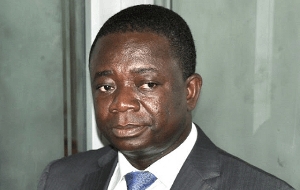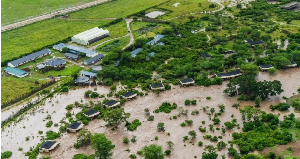- Home - News
- TWI News | TV
- Polls
- Year In Review
- News Archive
- Crime & Punishment
- Politics
- Regional
- Editorial
- Health
- Ghanaians Abroad
- Tabloid
- Africa
- Religion
- Election 2020
- Coronavirus
- News Videos | TV
- Photo Archives
- News Headlines
- Press Release
General News of Thursday, 26 November 2009
Source: GNA
Credible census, impetus for national development
Accra, Nov. 26, GNA - Next year's Population and Housing Census, like all other topical exercises, has engaged the attention of individuals, organizations and government because its successful outcome would serve as a stimulus for national development.
Indeed, policymakers, individuals, organizations, government and international organizations rely on data generated through census for planning the country's development.
Development experts need data to determine the quantum or type of development for a community while social workers would also require information for the assessment of needs of the people. Data from census assists government to effectively plan and allocate funds equitably for community programmes and services, including the provision of education, housing, healthcare, potable water and welfare interventions.
The District Assembly concept is key to Ghana's socio-economic and political development and the assemblies would need the data for planning and allocation of funds to build roads, schools, libraries, health centres and provision of water and other development projects. Both local and international non-governmental organizations rely on information and data obtained from census to provide interventions towards the welfare of the people.
Business organizations require data to assist them in locating factories, shopping centres, banks and offices for the creation of jobs. Assistance from foreign donors and other international financial organizations such as the World Bank depends largely on reliable data on the population.
Even though next year's census might be tedious and challenging, fortunately, Ghana has experience from previous censuses, since 1891 when the first exercise took place, to ensure a successful census next year. This notwithstanding, conscious efforts need to be made to overcome potential problems to enable the country to have a relatively accurate data to propel Ghana's development.
Sceptics, particularly persons engaged in economic activities, might resist or avoid the census because of the perception that it could be part of government's plan to improve the tax system or widen the tax net. Since time immemorial some people have considered taxation as a form of burden, oppression or domination.
No wonder in 1929, Ibo women of Eastern Nigeria fearing that the head-count being carried out by the British Colonial administration was a prelude to women being taxed, staged a protest that resulted in riots. Mrs. Augusta Okantey, Volta Regional Statistician, in an interview with Ghana News Agency, has given the assurance that data to be collected in next year's census would not be for tax purposes, to dispel whatever misconceptions that people have about the exercise.
She explained that the information would be critical references to ensure equity in the distribution of resources and for measuring the success or failure of national development programmes. Government would have to support the media to inform and educate Ghanaians, particularly those in the rural areas about the essence of the exercise to national development. The media would have to organize special programmes to disabuse the minds of the public about any false impression about the census to enable people to participate in exercise.
Even though the ultimate objective of political parties is to win power, it behoves them to support important apolitical national assignments such as the 2010 census. They should complement the efforts of the media by educating and encouraging their supporters to participate in the census. Opinion leaders including chiefs, heads of associations, the clergy and imams should also educate their followers on the significance of the census to development.
There is the need for officials who would be entrusted with the duty of carrying out the exercise to carefully select and train the enumerators or census takers in the understanding and application of census concepts to avoid mistakes.
School leavers, assembly members, unit committee members, personnel of the National Youth Employment and National Service Personnel should be recruited to assist in enumeration since they are more familiar with geographic and social characteristics of the various communities of the country.
Even though getting information from primary sources or someone immediately associated with information might be desirable, enumerators should make sure that they obtain information from adults and should avoid getting information from children or neighbours.
Enumerators would have to know days of rest or worship for the people of the areas under their jurisdiction, particularly in the rural areas where the people engage in various forms of agricultural activities and consider some particular days as taboo for working.
Enumerators are most likely to meet many people at home on these days. They can also visit mosques and churches immediately after worship and take information from the congregations. Census takers should also be aware of deliberately evasive attitude of people about ages and birth places and ensure the correct spelling of names and effective transcription of information from original records to actual copies.
Government should provide modern Information and Communication Technology to facilitate the exercise especially at the transcription stage but experts should be employed to avoid mistakes and loss of viable data. Census takers should be provided with modern and multi-purpose mobile phones and other communication equipment to ensure effective communication among census takers and the authorities at the district, regional and national officers.
For the sake of administrative convince, government should ensure house numbering and house listing ahead of the general census next year. The incidence of double-counting and irregularities could occur in the upcoming census. In 2000 it was normal for census officials to take records of the number of people living in a household even if they were not present resulting in double counting in some cases.
It is for this reason that Dr. Grace Bediako, Government Statistician, said people would be counted where they are located at a particular time by census officials and no one would be counted if he or she is not present at the time of the census exercise.
She explained that if a member of a household is out at work at a time of the counting, such a person will not be counted because he or she could be counted at his or her work place.
Census results, according to her, must be evaluated on the basis of the adequacy and efficacy of var ious quality control measures that were put in place during the process. Undoubtedly, there cannot be proper planning and implementation of national programmes or policies without a credible census and Ghanaians should embrace next year's exercise with enthusiasms.










